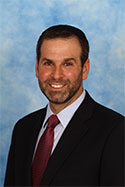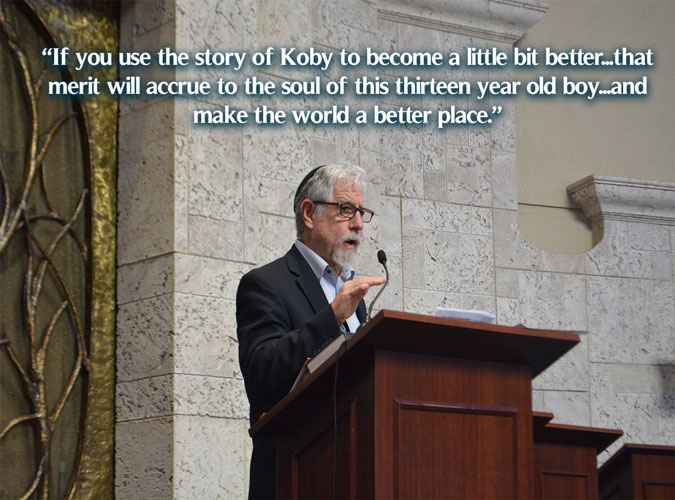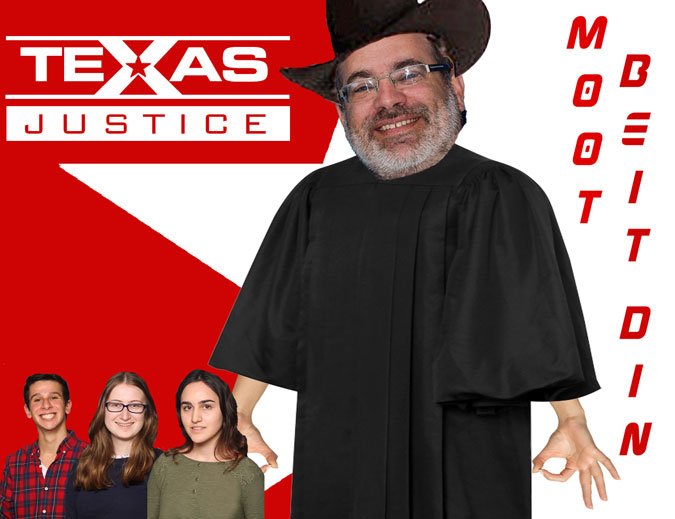|
April 7 , 2017
11 Nisan 5777
|
|
Candle Lighting at 7:22 PM
|
|
|
|
|
|
|
 Always in a Rush
We rush to airports to catch flights. We run through terminals to get to the gate before it closes. We speed down highways to get to our destination on time. Rushing is a common feature of travel. When the Jewish people left Egypt, they rushed too. כִּי בְחִפָּזוֹן יָצָאתָ מֵאֶרֶץ מִצְרַיִם - The Torah explains that we eat matzah on Pesach because we left Egypt in great haste. Were the Jewish people simply in a rush to escape like so many of us are when we travel or is there a deeper significance to their haste? Rav Yitzchak Hutner explains that when the Jewish people rushed out of Egypt they imprinted a certain spiritual dimension on our collective consciousness. When we rush, we aim to break free of our physical constraints. We strive to move beyond what is typically expected or what is considered physically possible. As the Jewish people rushed to leave Egypt and as we similarly rush to make matzah within the prescribed eighteen minutes we demonstrate that we are not satisfied with the status quo; we are always seeking higher levels and reaching beyond our grasp.
If you we will be away from home for Pesach, make sure to leave to the airport with plenty of time so that you don't have to rush too much, but in the spiritual sense may we all follow the path of our ancestors as we rush toward deeper and greater spiritual experiences.
Shabbat Shalom and Chag Kasher V'Sameach!
Sincerely,
Rabbi Jonathan Kroll
Head of School
|
|
|
Good and Welfare
|
Engagements
Elana Linker ('09)
to Yoni Spector
Michael Mizrahi ('10) to
Ayala Magder
Harry Pearl ('13) to Tamara Weinberg
Births
David ('07)
and Talya Atkin on the birth of their daughter.
Marriages
Sarah Struhl ('12)
to Jonathan Packer
|
|
|
|
|
|
|
|
|
|

A Speech to Remember
Rabbi Seth Mandell Kicks Off Shabbaton with Friday Morning Talk About the Murder of His Son and the Life of His Family After the Tragedy
 Graphic by Highlites Staff
Article by Matthew A. Samilow ('17)
Before embarking on its trip to Orlando for the fourth annual intergrade-shabbaton, the KYHS student body listened to a sobering speech by Rabbi Seth Mandell, father of Koby Mandell, a Jewish teenager murdered, along with his friend Yosef Ishran, by Palestinian terrorists in 2001. Rabbi Mandell spoke about the day of the attack, how a mundane workday turned to unimaginable grief. It was difficult to listen as Rabbi Mandell described the savage nature of the murders and utter shock it sent through his family and the Jewish community. In relating the effects the tragedy had on his life, Rabbi Mandell noted the premature end to his other children's childhood, the emotional hardship of remaining in Israel, and, most importantly, the tremendous good that emerged from such horror (as a result of Koby's murder, Rabbi Mandell and his wife, Sheri, started a foundation and camp that assist families of terror victims).
Far from beginning the shabbaton on a somber note, Rabbi Mandell's presentation stirred up a sense of pride in Zionism and was a dutiful reminder that much good can stem from tragedy. KYHS students walked away feeling inspired and ready to connect to the ancestral homeland of the Jewish People.
|

iOS4: OurLANDo
Discussions, Shiurim, Divrei Torah Explore Our Emotional Connections to the Land and State of Israel
Graphic by Sydney Freedman ('20)
Article by Matthew A. Samilow ('17)
The Shabbaton is supposed to be a fun and enjoyable, but it would also be remiss in its duty were it not be educational, as well. To this end, all students attended three sessions that were designed to explore their connection to the State of Israel. Your faithful scribe is, regretfully, not omniscient and thus can only speak about the sessions he attended. He is hopeful that will suffice.
On Friday night, all students attended a session, placement in which was determined by grade, that investigated our emotional connections to different objects and places in the context of Israel. My particular group, run by Mesdames Horowitz and Hegna, asked us to ponder, among other things, whether we can truly have a connection with a place we have never visited.
For their Shabbat morning class, students had their pick of the litter as the school offered a wide array of classes on a wide array of topics taught by KYHS faculty. I chose to attend Rabbi Jonathan Y. Kroll's discussion about the fragile compromise that exists in Israel regarding separation of church and state. We explored how the American and Israeli governments deal with religion very differently and what reforms, if any, the Israeli government should consider. Other classes included a halachic and moral discussion about immigration policy and the treatment of members of other faiths in the State of Israel, Post Traumatic Stress Disorder in children growing up in Israel, the debate on a one vs. two state solution, whether or not the ultra-Orthodox should serve in the Israel Defense Forces and many more.
In his remarks Shabbat morning during davening, Rabbi Kroll spoke of the difference between the culture of service that exists amongst Israeli teenagers and the college culture that we are so much a part of. He spoke of the need to change our "background music" - to surround ourselves with Jewish culture, as we live in a society with so much good, but also so much noise. In doing so, Rabbi Kroll suggested that students change the lock screen image on their phone to that of a hero who will remind them of their greater purpose. After Shabbat, many students changed their lockscreens and shared those images on social media using #LockScreenHero; Simcha Leiner announced at his concert that inspired by Rabbi Kroll's remarks had changed his lock screen image. In addition Rabbi Kroll sang the praises of listening to Jewish music and even created a Spotify playlist, which he shared with the school community.
Last, but certainly no less grand, each grade heard from a panel of KYHS faculty regarding their opinions on a host of hot-button issues about Israel. The eleventh and twelfth grade panel, hosted by Mrs. Holly Seidenfeld, featured Rabbi Grajower, Mrs. Kanner, Rabbi Horowitz, and Dr. Wolf. Mrs. Seidenfeld and students pressed the panel on issues such as support for a two-state solution, whether the school should encourage Aliyah, and whether KYHS should bring in speakers with more diverse viewpoints. The educational programming left the students enriched and more informed, while keeping them fully engaged.
|

Simcha Leiner Live in Orlando
Guest Star Steals the Show with Davening, Tisch and Concert
Graphic by Maurice Bensmihen ('17) and Akiva Groman ('19)
Article by Max C. Wiederhorn ('18)
Simcha Leiner was a man on a mission. Simcha Leiner was a star. KYHS students spent their Shabbaton, iOS4: OurLANDo with one of Jewish music's biggest stars. Leiner led an uplifting Kabbalat Shabbat, had students singing with him at a post-dinner tisch, led Shacharit and Musaf and capped the weekend off with a Motzaei Shabbat concert, which has students still humming his tunes a week later. It is safe to say KYHS students are now enamored by Leiner. Jordan Hammerman ('20) exclaimed "Simcha Leiner was awesome. I wish every Shabbat can be a Simcha Leiner Shabbat." Not only did Leiner perform for the students, but he connected and chatted with them as well. School President Ayala Broide ('17) declared, "Simcha Leiner was so friendly. He introduced himself to all of us and really made an effort to get to know us. Great singer but even better guy." Mission accomplished.
|

Excursions Galore
Students Choose From a Cornucopia of Options for Sunday Trips to Cap Off Fun-Filled Shabbaton
Graphic by Ariel Schneider ('17)
Interview by Max C. Wiederhorn ('18)
Highlites writer Max C. Wiederhorn sat down with Rabbi Danny Kroll to discuss this past week's all-school Shabbaton, iOS4: OurLANDo.
Max C. Wiederhorn: Rav, I'd just like to thank you on your part of creating such a splendid Shabbaton.
Rabbi Danny Kroll: Thanks Max, I really appreciate it. A lot of hard work went into planning the Shabbaton. I, however cannot take all of the credit because the bulk of it belongs to Shira Englander, whose behind the scenes work is sometimes overshadowed when I'm standing in front of the crowd making announcements and wearing money suits. The teachers who came on the Shabbaton, some with and some without their families also deserve a ton of credit. Most of all though, I believe, the students and their ruach made the Shabbaton the memorable experience it was.
MCW: Why is a school-wide Shabbaton so important?
RDK: We think it's important for students and faculty to engage, interact and learn together in an informal setting. There's no better time to do this than Shabbat and there's no better way of doing this than by going away from our homes and comfort zones. The learning sessions allow us to explore topics we don't necessarily get to address as much as we would like to in a classroom setting. On top of all of that there's just something nice about a group of nice Jewish kids hanging out and talking with each other and their mentors.
MCW: What was the inspiration behind the Shabbaton's Israel-based theme OurLANDo?
RDK: When Shira and I met with Rabbi Kroll we decided that we want to use Shabbatonim to the core values of our school, some of which aren't always so easy to address in the classroom on a consistent basis. That's why two years ago the Shabbaton focused on God, last year on the intersection of religion and culture and this year on our connection to the Land and State of Israel. We're a Religious Zionist school, we have a Zionism class for seniors, celebrate Israel's holidays and come together during its times of need, but rarely do we get a chance to delve into some of the more nuanced and complex issues that arise regarding the modern State of Israel.
MCW: Yosef Linzer ('18) claimed, "This was the greatest Shabbaton ever!" what did you guys do different this year than years past?
RDK: I'm glad he feels that way, I loved it too. I think it was a combination of a number of things - the theme worked well, Simcha Leiner added so much to davening and singing and the ability to choose for, a number of Sunday activities made everyone happy.
MCW: Always a pleasure, thanks for your time Rabbi.
RDK: Anytime, Chief.
|

Moot Beit Din
KYHS Students Impress at National Competition in Houston
 Graphic by Yosef Linzer ('18)
Article by Lana Rosenthal ('17)
This article originally appeared in The Florida Jewish Home
In the middle of March, students from the Katz Yeshiva High School of South Florida joined 36 teams of students from Jewish day schools and supplementary schools from across North America to compete in the 2017/5777 Prizmah Moot Beit Dincompetitionin Houston, Texas. Moot Beit Din challenges Jewish high school students to examine the ethical and moral dimensions of Jewish law through creative engagement with contemporary situations. Each team of students prepared a written decision and presented an oral argument before a panel of rabbis, scholars, and lawyers, in response to a case.
This year's case asked students to consider the legal liability and responsibility for the actions of a self-driving car through the lens of Jewish law. Students also put forth an opinion on how self-driving cars should be programmed to meet the highest Jewish ethical standards. The KYHS delegation consisted of seniors Miriam Gammerman and Lana Rosenthal and junior Ty Kay and was supported by advisor Rabbi Benjy Horowitz. The team earned the the second place prize in the Abella division of the competition, the division that requires teams to find their own argument sources. For months leading up to the competition, Gammerman, Rosenthal and Kay, with the help of Rabbi Horowitz, analyzed the case and searched for Talmudic sources in order to develop a coherent position. After much research, they drafted a ten page paper detailing their ruling on the case, submitted it, and began formulating their oral presentation. While this was the third year that Katz Yeshiva High School has participated in the competition, each of the students on the team was new to the competition. Rabbi Horowitz, who guided the students through the research and writing process, said, "My students who participate in Moot Beit Din are motivated to carefully analyze Jewish texts and make connections between the laws and their own lives. Each year I see how this program excites my students and gives them a fresh understanding of Jewish law." Upon arrival on Thursday afternoon, the students split into groups to focus on the theme of the competition, the increasing role of technology in our lives. They discussed the benefits and distractions of cellphones, computers, and even self-driving cars, the focus of the Moot Beit Din case, and the ways we can employ technology to enhance our world. During Thursday evening's program, "Shark Tank: Rejewvenating Tech" teams of students pitched ideas for technology products inspired by Jewish values that bring meaning and purpose to people's lives. On Friday, participants visited the Johnson Space Center, where they toured model shuttle Independence and shuttle carrier aircraft 747 and learned about efforts to land on Mars. Gammerman remarked, "Visiting NASA was one of my favorite parts of the weekend because we were able to explore the theme of the case in a different way. Between analyzing spaceships and self-driving cars, we got a sense of how technology's impact on our lives is only just beginning. It was an especially meaningful experience because I was able to share it with students from incredibly diverse backgrounds. Whether exploring exhibits together or buying trinkets at the gift shop or spending time with one another throughout the weekend, I realized that we are as similar as we are different. " Such feelings of camaraderie defined the weekend. Leading up the competition, students spent Shabbat together as a community, participating in text-study sessions, prayer services, and meals. By sharing in these experiences and the competition, they formed a vibrant network of committed and intellectually curious Jewish teenagers that will extend beyond the weekend. Rosenthal recalled, "I sat with kids from a pluralistic California high school for dinner and ate lunch with girls from a Kentucky public school. Each person at the competition had a different background and relationship to Judaism, but we all came together over our devotion to Jewish Law." On Sunday morning, after each team had presented their oral arguments and undergone a round of critical questions, judges praised the students for their excellent analyses, sincerity, and commitment. When KYHS was announced as second place winner in the Abella division, team members were ecstatic. Kay stated, "I was incredibly proud of the work we did to create a coherent ruling free of contradictions. We spent hours researching, thinking, and writing, debating back and forth over different positions, addressing sources that did not fit with our rulings. When we finally finished our paper, it was so gratifying to know that I had contributed to that ten-page decision of complicated Jewish law. Winning second place made the experience even more rewarding."
|
Matzah Baking
Juniors Prepare for Pesach With Trip to Local Matzah Bakery
Graphic by Justin Isaacs ('19) and Akiva Groman ('19)
|
This Week In Pictures
 Graphic by Maurice Bensmihen ('17)
|
|
The Yeshiva Highlites Staff
|
|
|